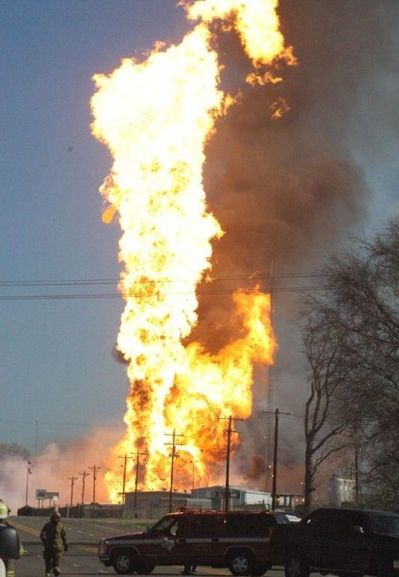Explosions can result from natural causes, industrial accidents, aging utility infrastructure or terrorist attack. After an explosion, terrorist attack, or other random act of violence there can be a second event that cause as much damage as the first so care should be taken
The threat of terrorist attack have and will continue to escalte. Explosive devices are frequently used to carry out such attacks, these devices can be highly portable, using vehicles and humans as a means of transport. They are easily detonated from remote locations or by suicide bombers and have been used to damage and destroy financial, political, social, and religious institutions.

Before an Explosion
- To begin preparing, you should build an emergency kit and make a family communications plan.
- Know emergency evacuation procedures, and where emergency exits are located.
If you have a good idea of where the blast will happen:
- lie flat on your chest on the ground, with the soles of your feet facing the area of the blast.
- The goal should be to have your body, if possible, below the plane of the ground.
- Spread your legs moderately apart: if you tighten your legs together, you increase the chances of losing both legs, whereas when the legs are spread apart, you have a greater chance of saving one leg from the blast; spreading the legs too far apart, however, leaves the groin exposed.
The majority of deaths from explosions come from the pulse of air created by the blast. This air travels outward in all directions as a shockwave. The most dangerous aspect of this shockwave is what it does to a human's lungs. It's natural in the event of a crisis moment for a human being to take a deep breath and hold it. This turns one's lungs into a pressurized balloon. When the shockwave hits the body, that balloon bursts, causing massive internal injury to the inner surface of the lungs. Thus most bomb victims die from internal bleeding in the lungs. They literally drown in their own blood. The best way to avoid that fate is:.
- Keep your mouth open and your air passages open. Do not breathe deeply..
- While laying on the ground during a bombardment, breathe in and out in rapid little pulses, all the while taking care to never fully close your air passages..
You must choose what to do with your hands. Some people instinctively cover their ears at the sound of a blast. If you're close to a large explosion, you will probably have both eardrums burst, even if you cover them with your hands (due to the aforementioned shockwave).
- While laying flat on the ground, the idea is to reduce your lateral profile as much as possible, which means laying with one cheek on the ground. Place one hand tightly over your exposed eye.
- Place the other arm against your body.
During an Explosion
- Get under a sturdy table or desk if things are falling around you. When they stop falling, leave quickly, watching for obviously weakened floors and stairways. As you exit from the building, be especially watchful of falling debris.
- Leave the building as quickly as possible. Call low if there is smoke.
- Do not use elevators.
- Once you are out, do not stand in front of windows, glass doors or other potentially hazardous areas. Move away from sidewalks or streets to be used by emergency officials or others still exiting the building.
- If you are trapped in debris:
- Use a flashlight, if possible, to signal your location to rescuers.
- Tap on a pipe or wall so rescuers can hear where you are.
- If possible, use a whistle to signal rescuers.
- Shout only as a last resort. Shouting can cause a person to inhale dangerous amounts of dust.
- Avoid unnecessary movement so you don't kick up dust.
- Cover your nose and mouth with anything you have on hand. (Dense-weave cotton material can act as a good filter. Try to breathe through the material.)
After an Explosion
- Heavy law enforcement involvement at local, state and federal levels follows a terrorist attack due to the event's criminal nature.
- Workplaces and schools may be closed, and there may be restrictions on domestic and international travel.
- You may have to evacuate an area, avoiding roads blocked for your safety.
- If the explosion is near your home:
- Check for damage with a flashlight
- Do not light matches or candles.
- Do not turn on electrical switches
- Sniff for gas leaks. If you smell gas or suspect a leak, turn off the main gas valve, open windows, and leave quickly.
- Shut off damaged utilities.
